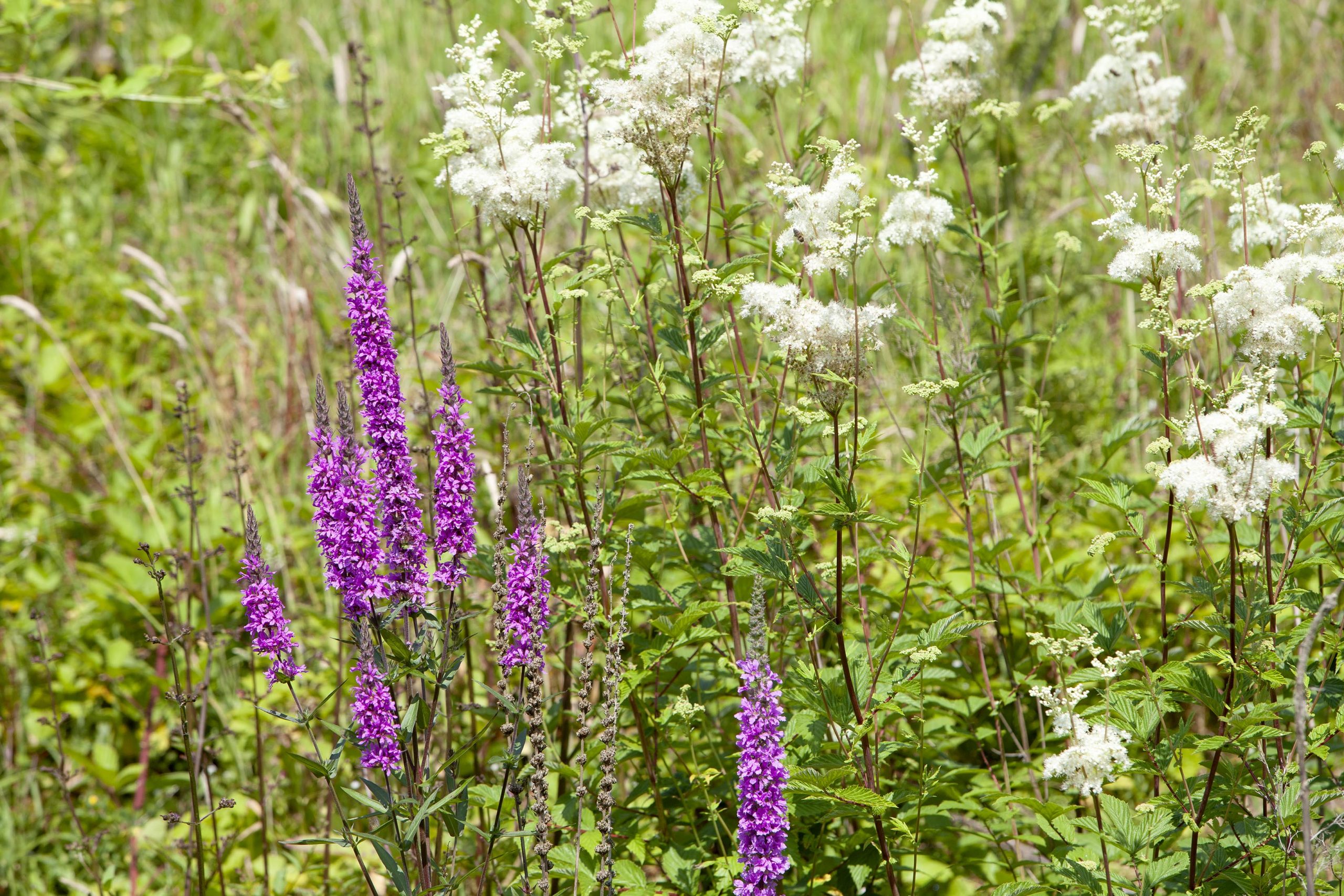Overview
Falmouth University and the University of Exeter both declared a climate and ecological emergency in 2019, alongside many other universities and colleges across the world. This led to the development of formal sustainability policies to embed sustainability across all aspects of university and life on campus.
Both universities have set net-zero decarbonisation targets including wider sustainability targets, you are able to view these on the Falmouth University sustainability home page and University of Exeter sustainability home page.
Our role at FX Plus is to support the universities in achieving their targets by embedding sustainability across all FX Plus Services and the campus estate.
In 2020, we launched our first sustainability policy which established a series of work streams in order to achieve the university net-zero and wider sustainability targets: Energy and Utilities, Waste and Recycling, Sustainable Travel, Procurement, Food and Drink, Biodiversity, Buildings, Environmental Compliance and Communications.
Please take a look through the pages below to find information about what is already taking place, and the ways you can get involved. You can also contact our Head of Sustainability directly on sustainability@fxplus.ac.uk.
Read our Sustainability Policy.
- Energy and Utilities
- Sustainable Travel
- Food and Drink
- Biodiversity
- Procurement
- Waste and Recycling
- Buildings
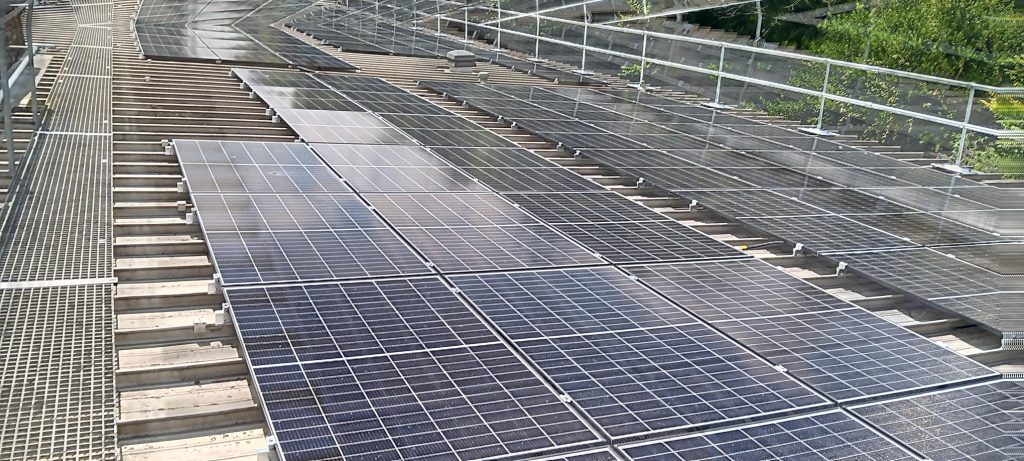
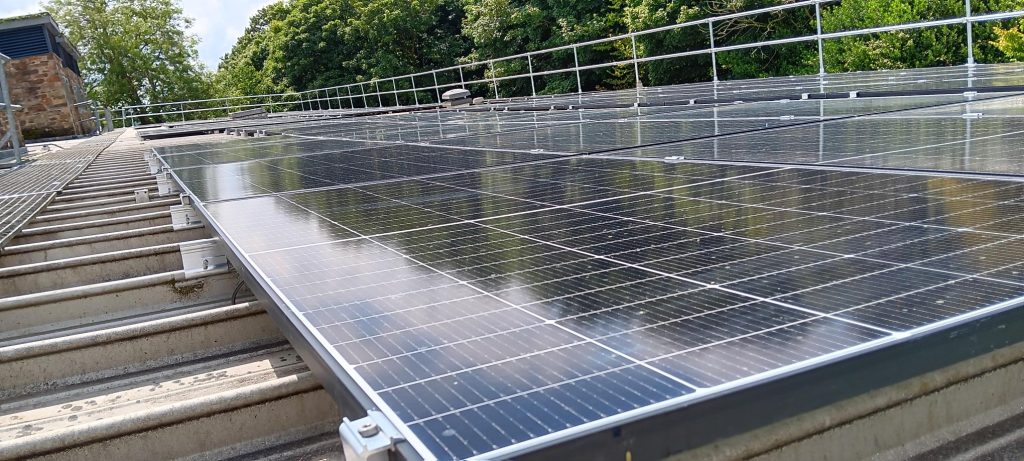
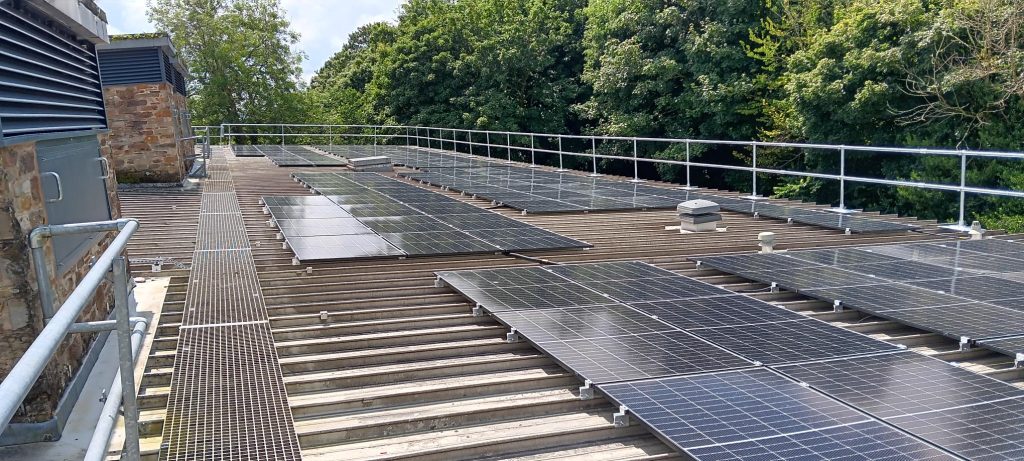
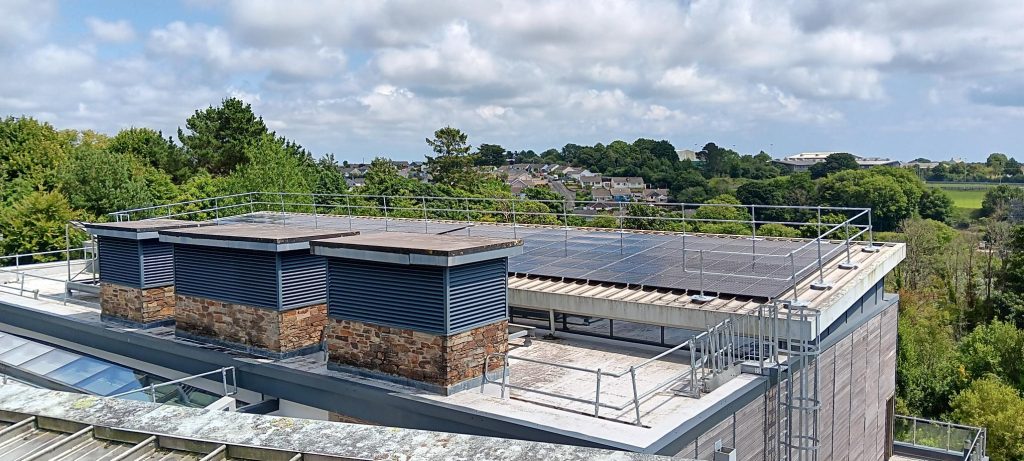
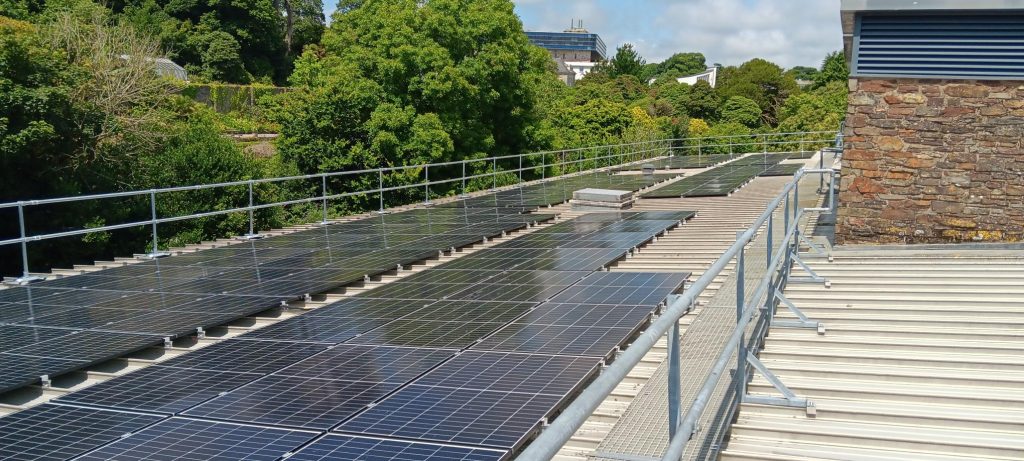
Our target is to achieve net-zero emissions in our energy (scope 1 & 2) emissions by 2040. The 2024/25 energy recordings identified:
- Reviewing our carbon emissions based on gross internal area (CO2e per m2) against a 2005/2006 baseline, Penryn Campus has now seen a 61% reduction, with Falmouth Campus just behind with a 67% reduction – significantly ahead of our target of a 50% reduction by 2025.
Solar Panel Installations: solar photovoltaic (PV) systems have been fitted across our campus buildings including Daphne Du Maurier, Peter Lanyon, Sport Centre and AMATA. These installations are projected to generate around 800 MWh of renewable energy annually, cutting emissions by approximately 170 tCO2e each year.
LED Lighting Upgrades: these have been completed in the Peter Lanyon, ESI Labs and main areas of the AMATA buildings. The upgrades are expected to lower carbon emissions by approximately 12 tCO2e annually.
Sub-metering enhancements: installation of over 100 sub-meters has continued this year, providing detailed energy usage data to support future efficiency projects and monitor the effectiveness of implemented initiatives.
Gas Decarbonisation: Feasibility studies have been conducted in order to understand how to phase out on-campus gas boilers to energy efficient solutions such as Battery storage and renewable energy solutions.
What our plans are: Penryn Campus is advancing sustainability through various decarbonization projects. Glasney Village, a significant carbon emitter, is the focus of an eco-block pilot project at Glasney Parc Block A, incorporating technologies like solar PV, heat pumps, and battery storage. LED lighting upgrades across key areas, including AIR and campus streetlights, aim to cut 15 tCO2e annually, with further phases planned as resources allow. Additionally, the campus is expanding EV charging infrastructure to meet rising demand, with feasibility studies and new installations planned for Car Park F.
Other initiatives include a University of Exeter-led wind turbine project, aiming to install a single turbine at Treliever Research Field, to potentially generate 2,803 MegaWatts an hour of clean electricity each year. This is equivalent of around 750 domestic households’ annual electricity usage each year (based on UK averages).
Heating system decarbonization for the SERSFs and Stella Turk buildings is also under review. Collectively, these projects reflect a robust commitment to reducing the campus’s carbon footprint and transitioning to sustainable energy practices.
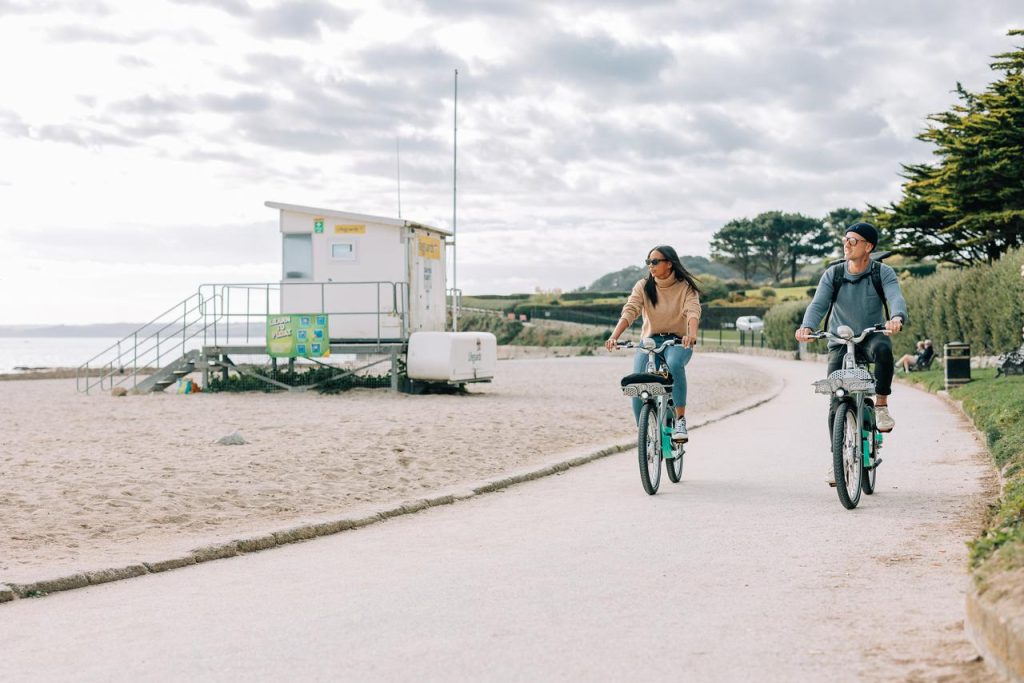
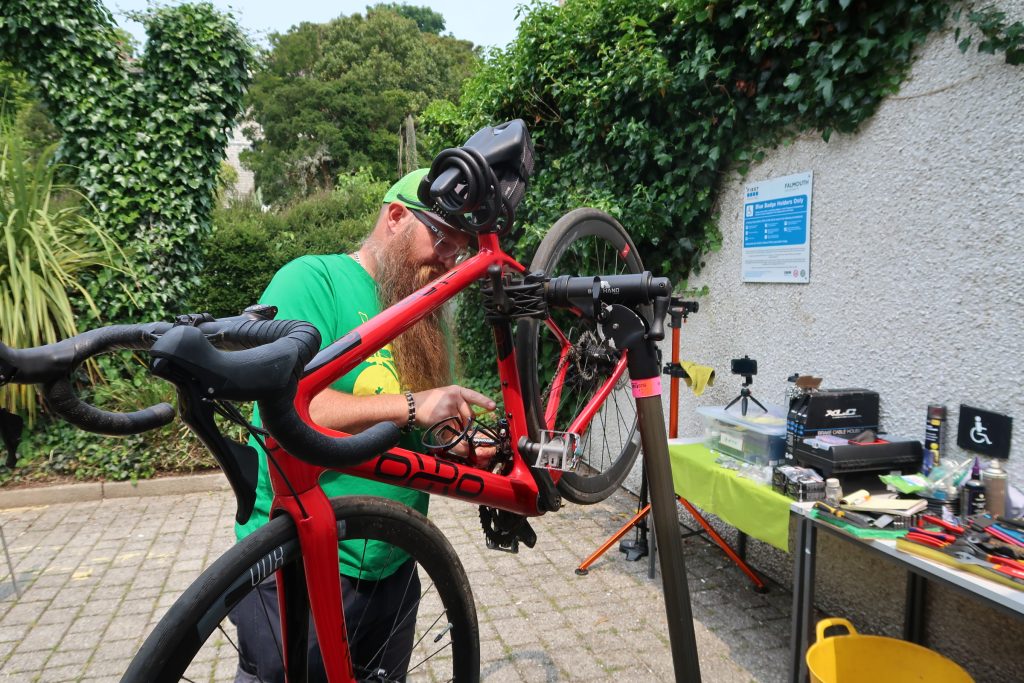
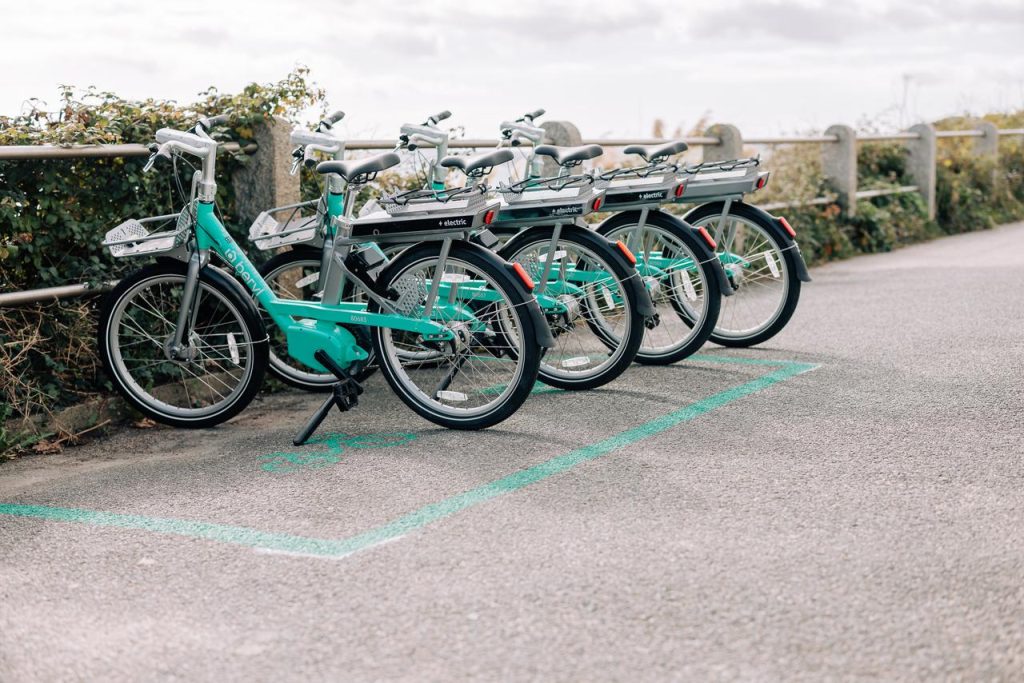
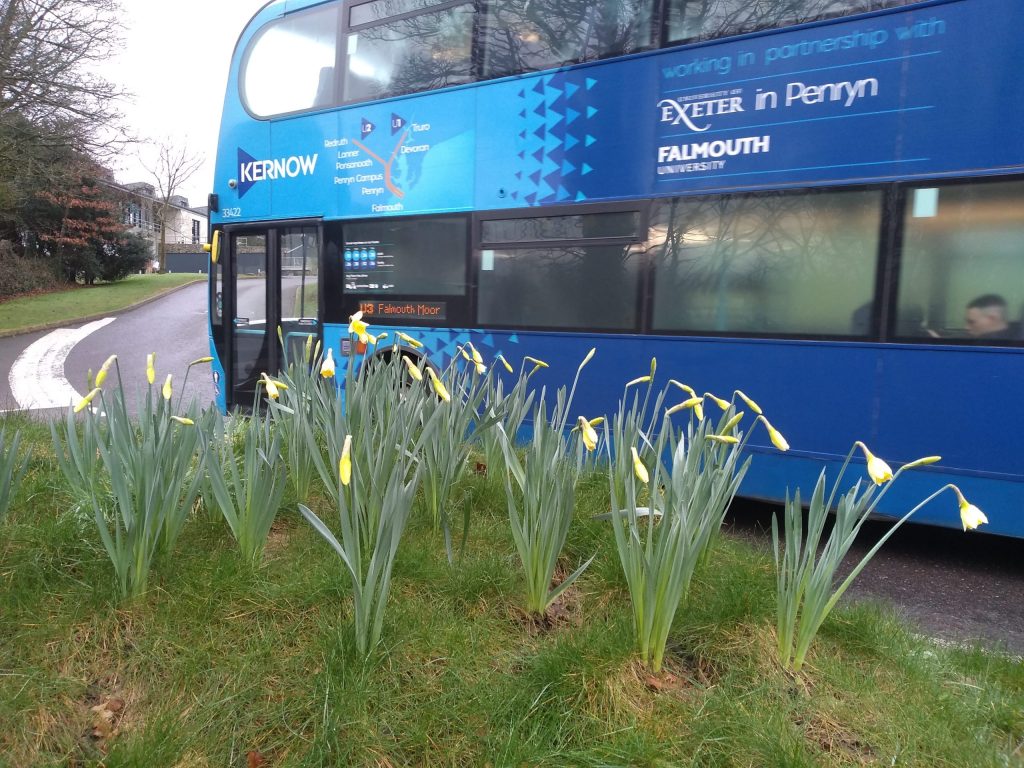
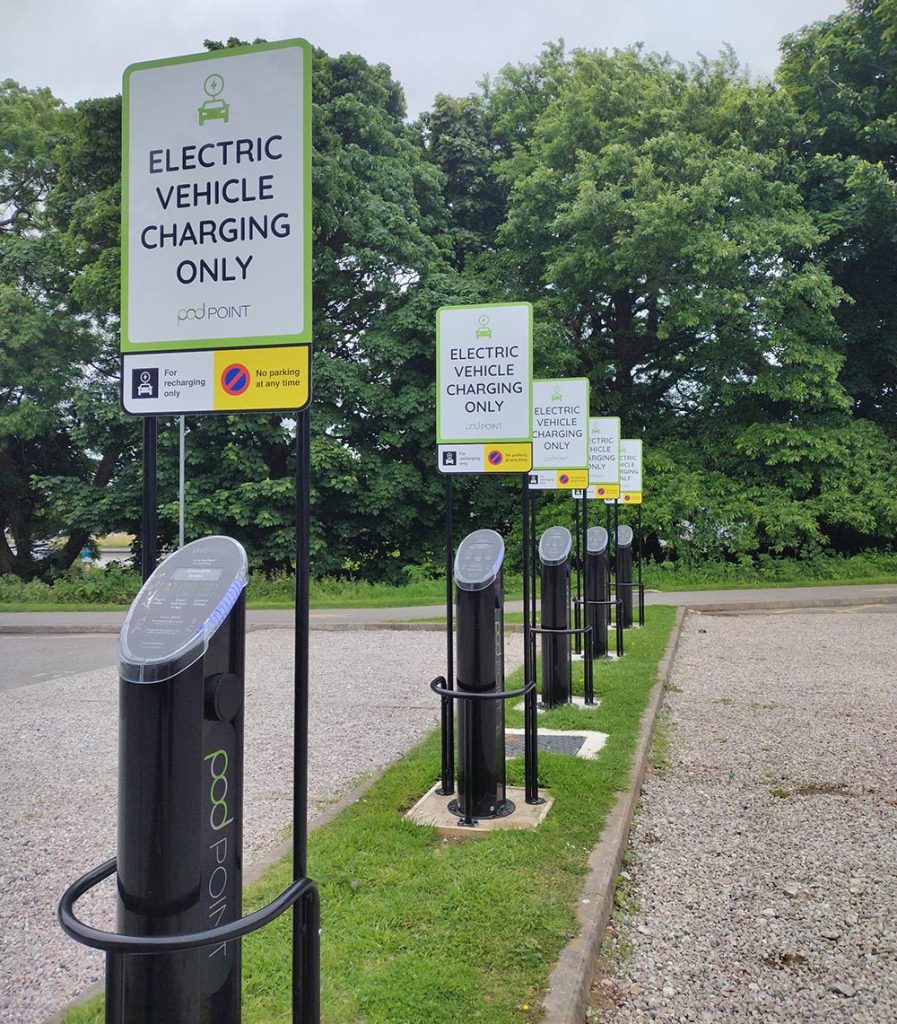
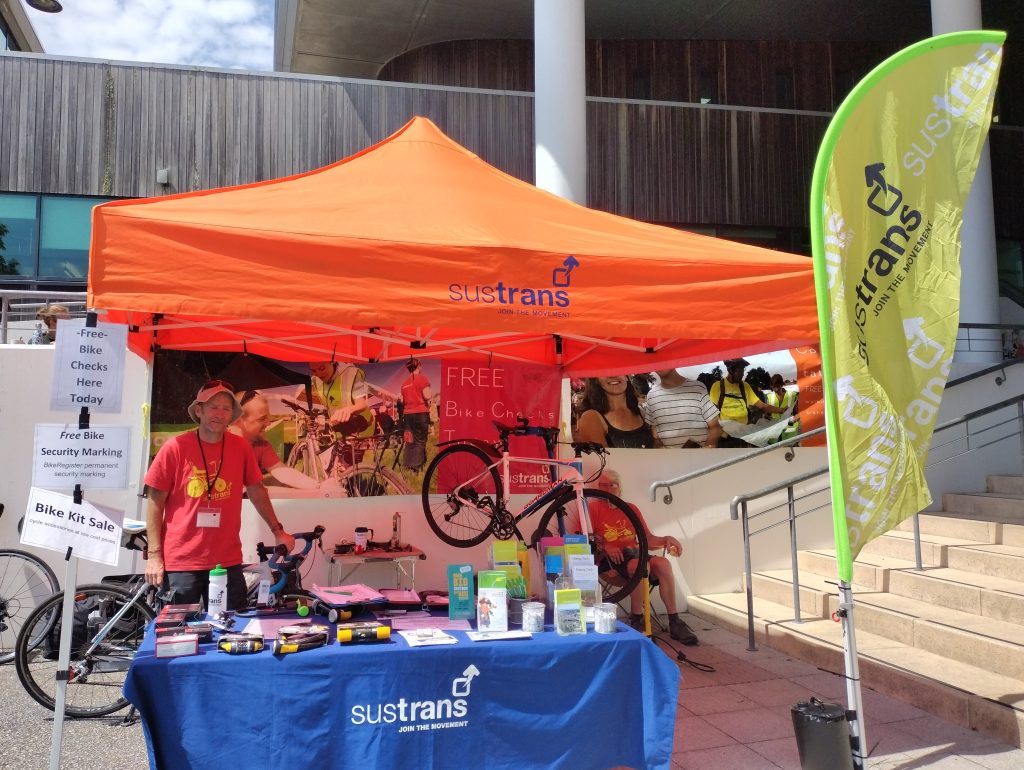
As part of the Universities’ net-zero plans, students and staff are encouraged to use public transport and active travel modes. This helps support our efforts on decarbonisation as well as reducing local traffic congestion and pollution.
Campus bike storage and changing facilities:
Both of our campuses have plenty of bike storage facilities including fully covered bike shelters. At Penryn campus, our Sports Centre shower rooms and changing facilities are free of charge for all students and staff to use.
Electric bike hire scheme:
Electric bikes can be hired on campus. As part of a county-wide scheme funded by Cornwall Council, fifty Beryl Bikes are available at 21 stations across Falmouth and Penryn, including on Penryn Campus, outside the Exchange opposite Heart Reception and along the Old Drive.
Buses and trains
We recommend downloading the Transport for Cornwall app to purchase the most suitable bundles for your commute. This will help save you money over the year rather than paying for the bus for each individual trip. There is also a train station at the bottom of campus which links through from Falmouth Docks Station ending at Truro Train Station.
Electric vehicle charging points:
Electric vehicle (EV) charging points are available at Penryn Campus. While we encourage walking, cycling, or using public transport, we recognise that this is not always practical in Cornwall. These EV points support owners of more sustainable vehicles.
Gold Cycle Friendly Employer Accreditation
Cycling UK has awarded Penryn Campus a Gold Cycle Friendly Employer Accreditation through its national Cycle Friendly Employer program. The gold award is the highest standard available and demonstrates the campus’ commitment to active travel, combatting climate change and improving staff and student wellbeing.
For more information, please see our Travel and Transport page.
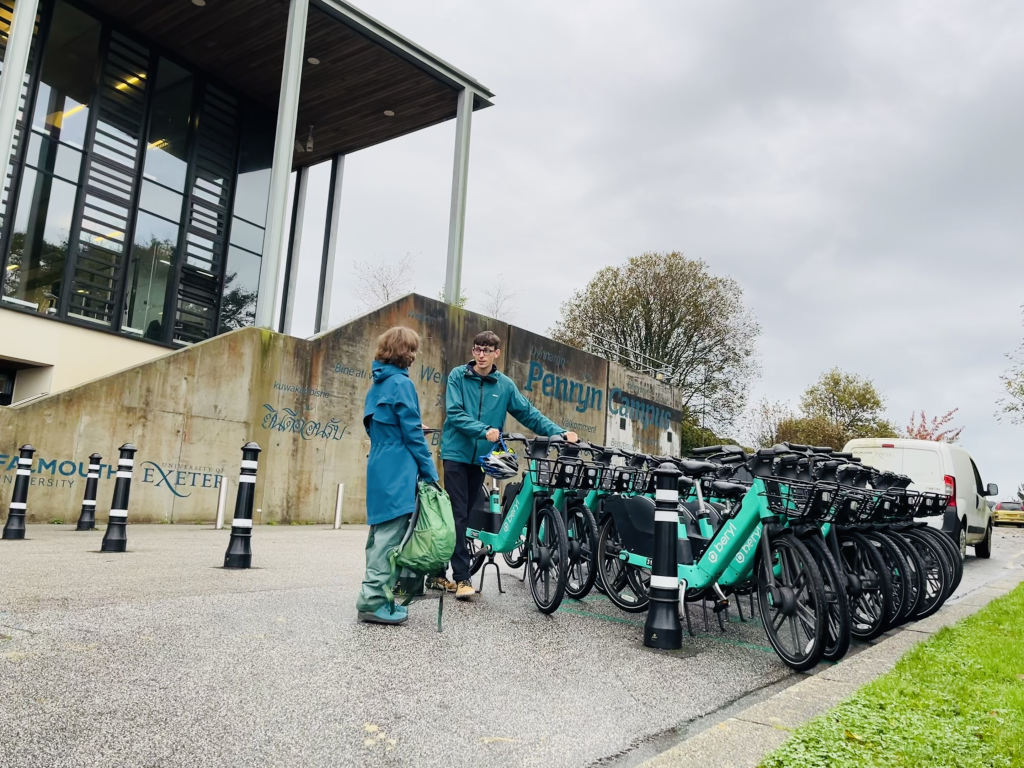
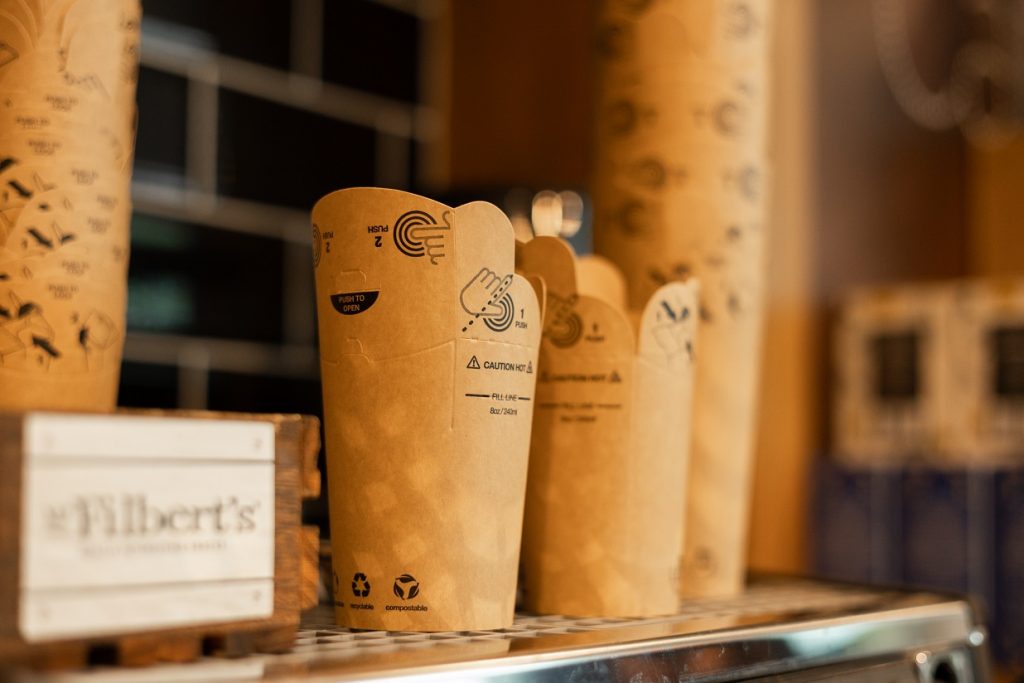
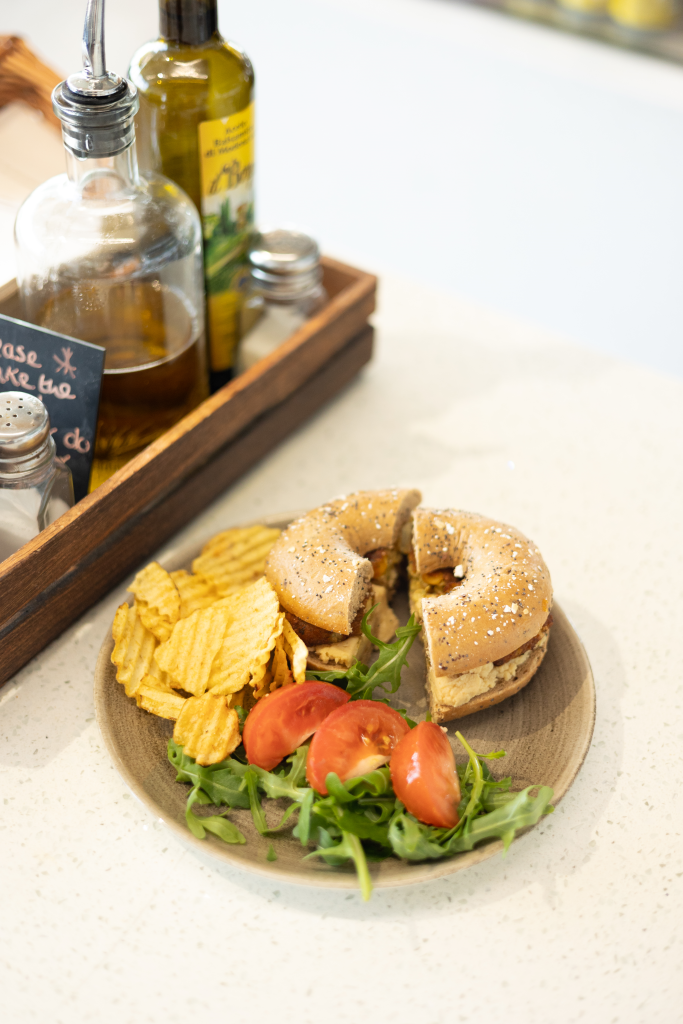
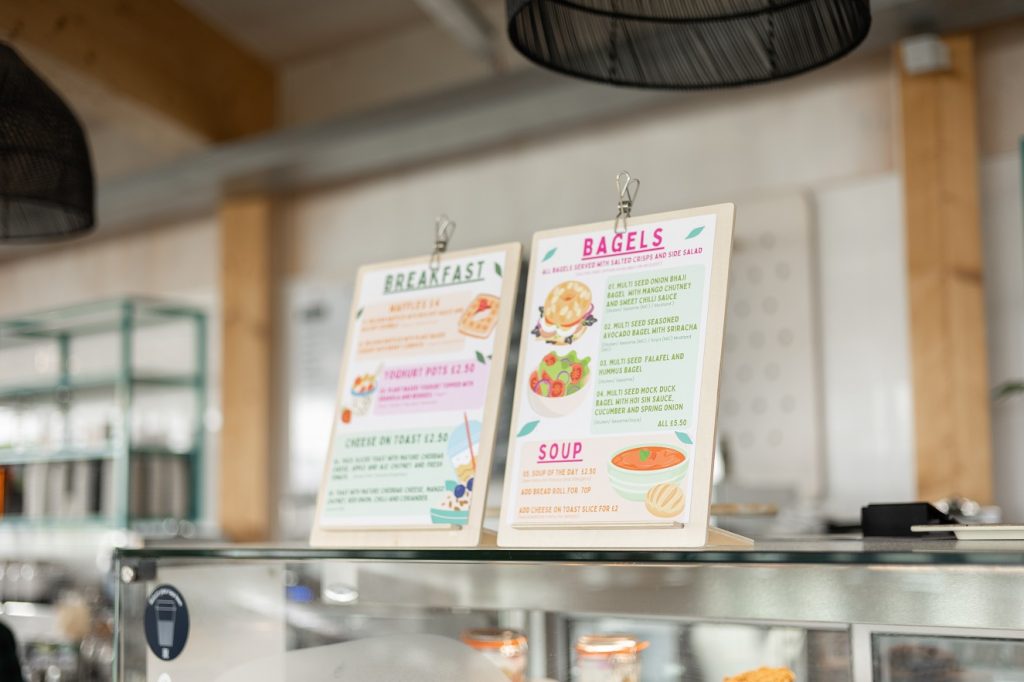
Our commercial outlets aim to source local suppliers wherever possible and integrate sustainability across our food, packaging and waste disposal.
The Commercial teams continually engage with suppliers to reduce the environmental impacts of its operations, and Fairtrade and south-west suppliers are sourced whenever possible. Using local suppliers helps reduce carbon emissions associated with transport and supports our local economy.
The menus on campus have been updated to include more vegan and locally sourced produce with the Sustainability Café serving 100% vegetarian and vegan dishes.
To minimise plastic wastage on campus, a sustainable milk refill initiative is open to all, and we also encourage the use of our reusable cup scheme.
The Penryn Campus Shop offers a Bring Your Own (BYO), self-service refill section to reduce unnecessary packaging and waste. The refill range includes cereals and breakfast food; pasta; rice and snacks. Meat is locally sourced and there is a vegan food section. The shop also uses the Too Good To Go app to try and reduce food waste.
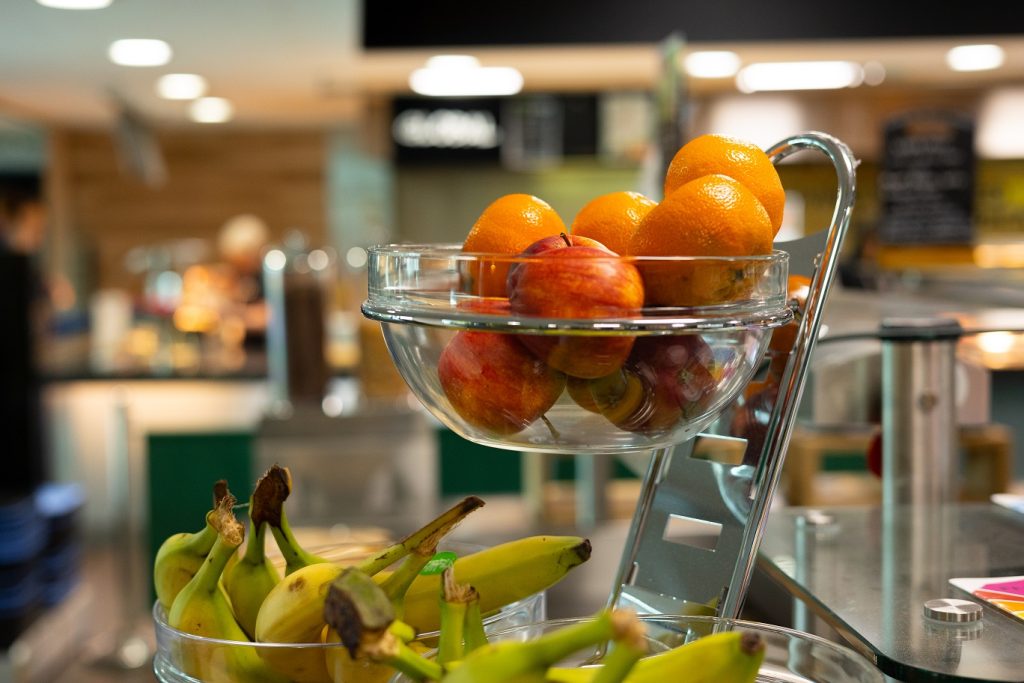
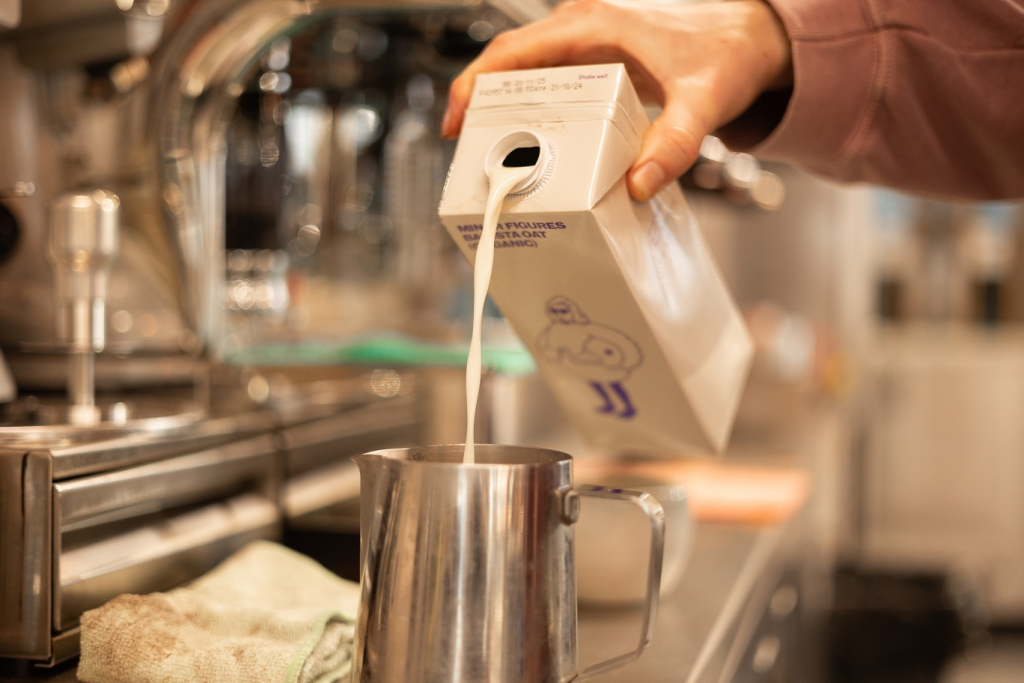
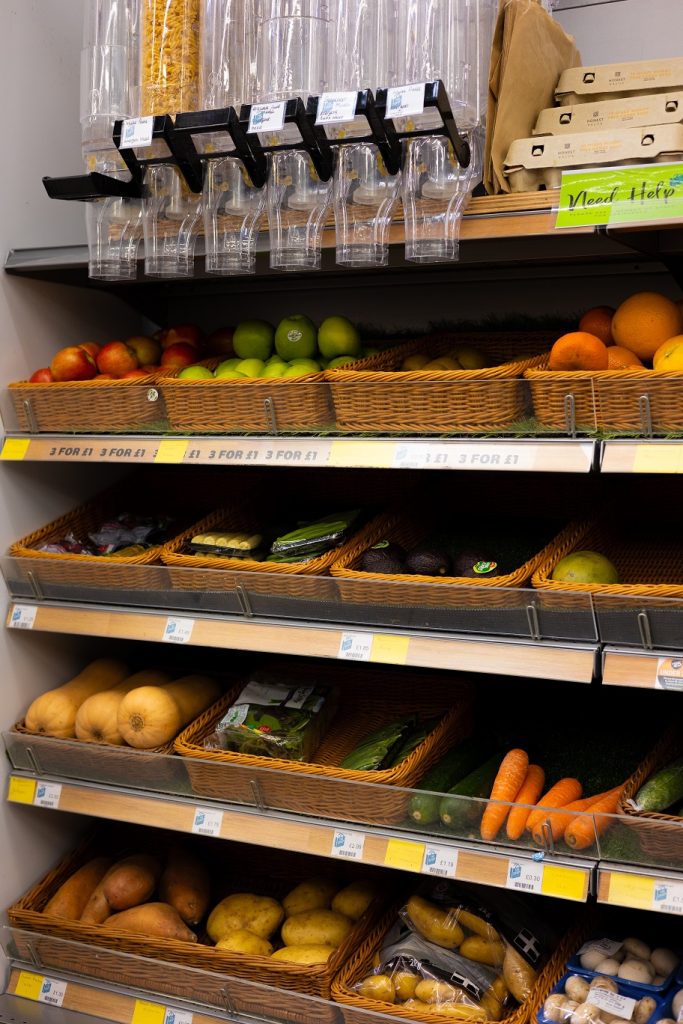
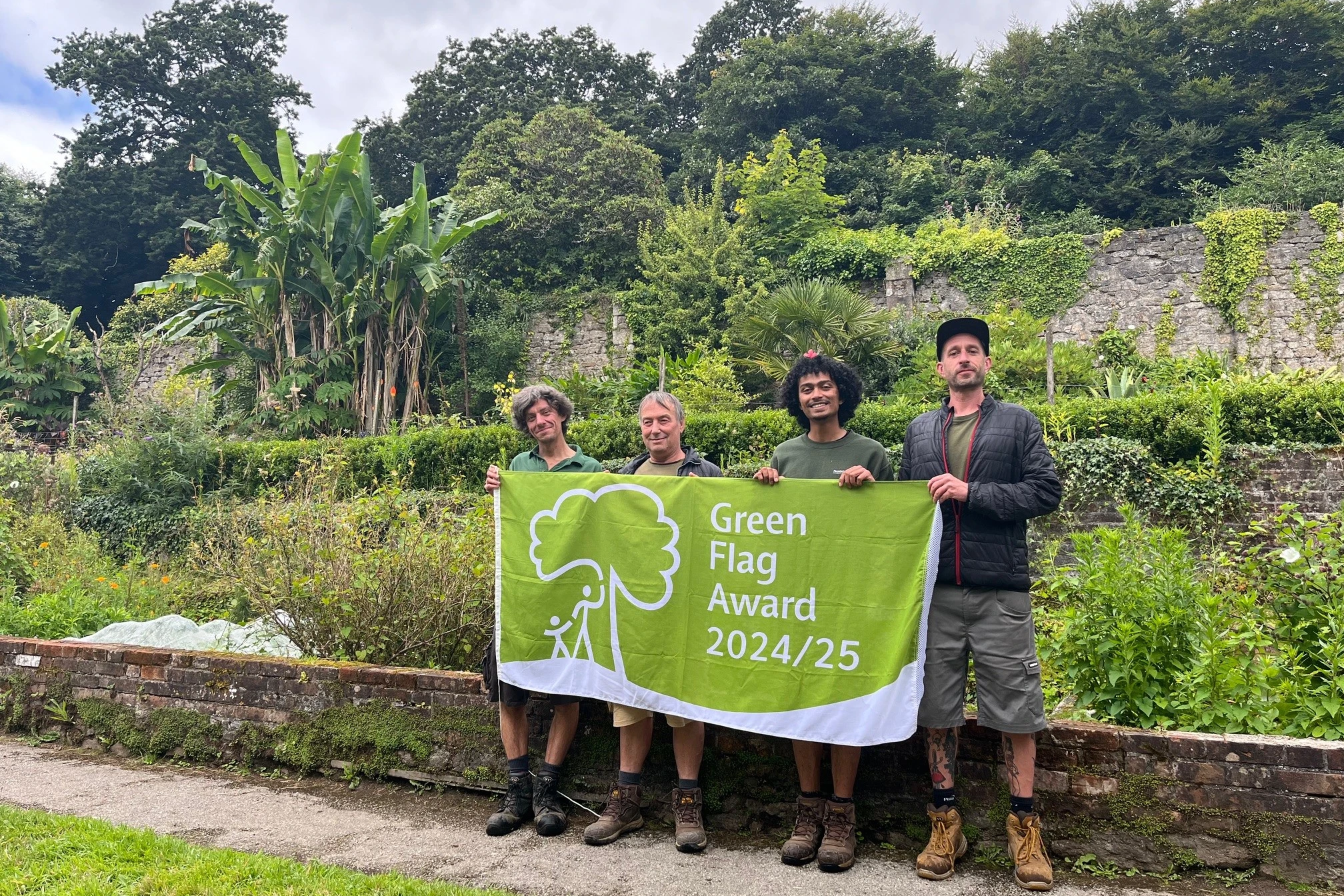
What we’ve achieved over the last five years:
Our campus biodiversity is one the main attractions and features for students, staff and the local community.
Penryn Campus recognised by the Green Flag Award Scheme
For the seventh year running, our Penryn Campus has been recognised by the international Green Flag Award Scheme which recognises well-managed parks and green spaces, setting the benchmark standard for the management of green spaces across the United Kingdom and around the world.
Wildflower meadows and planting
Since 2020, we’ve adopted a relaxed mowing regime to give way for dedicated wildflower meadows across our campuses. These spaces enrich flora and fauna as well as the on campus experience.
Last year (2024/25) we doubled the amount of wildflower plants to 2,320 as part of our continual day-to-day efforts to enhance the campus biodiversity.
Measuring biodiversity
We recently undertook a biodiversity survey for Penryn Campus using the Natural England biometric tool. This allows us to understand Penryn Campus’ baseline biodiversity value, the opportunities we have to enhance this, and the predicted gain in value if we were to implement these.
Research provided by ecological consultants Plan for Ecology Ltd showed that Penryn Campus has 289.18 habitat units, 3.88 river units, and 66.53 hedgerow units, and we have an opportunity to increase these to 346.46, 5.33 and 73.45 units respectively through the planting of new, urban tree species and Cornish hedgerows, improving the quality of our on-site heathland and scrub, and create a waterway management plan.
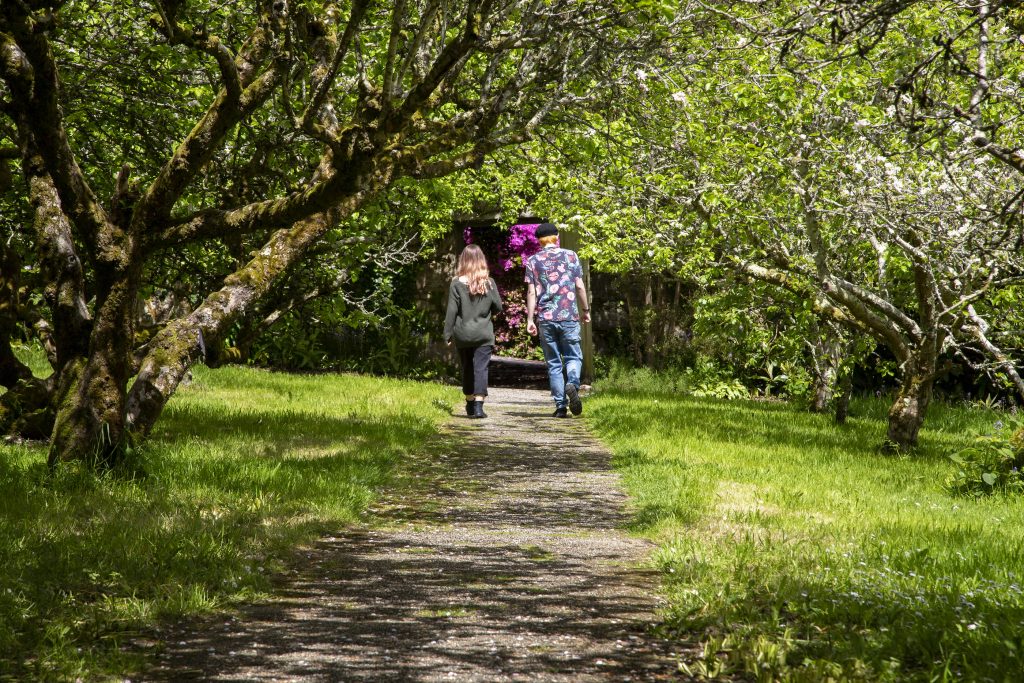
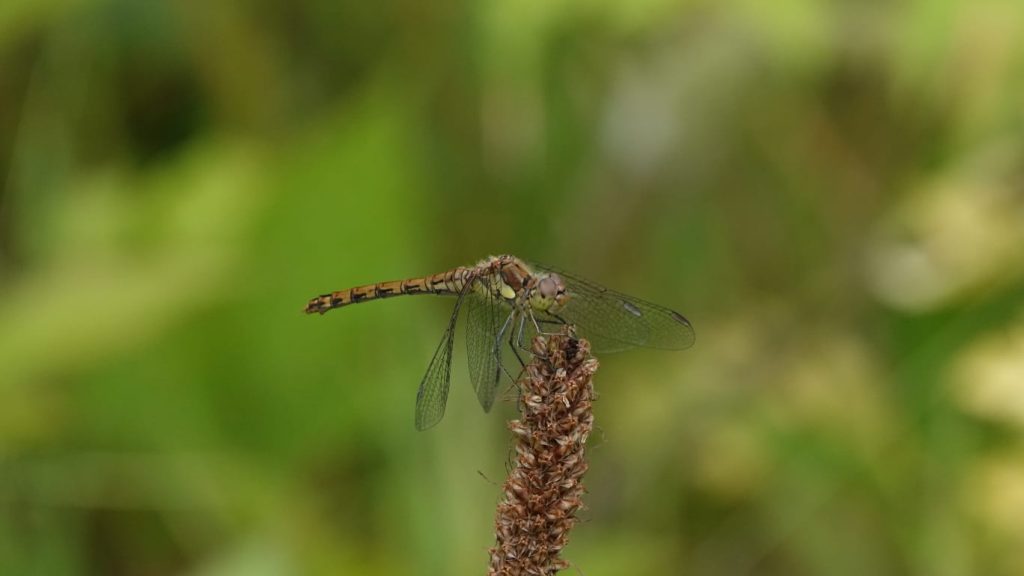
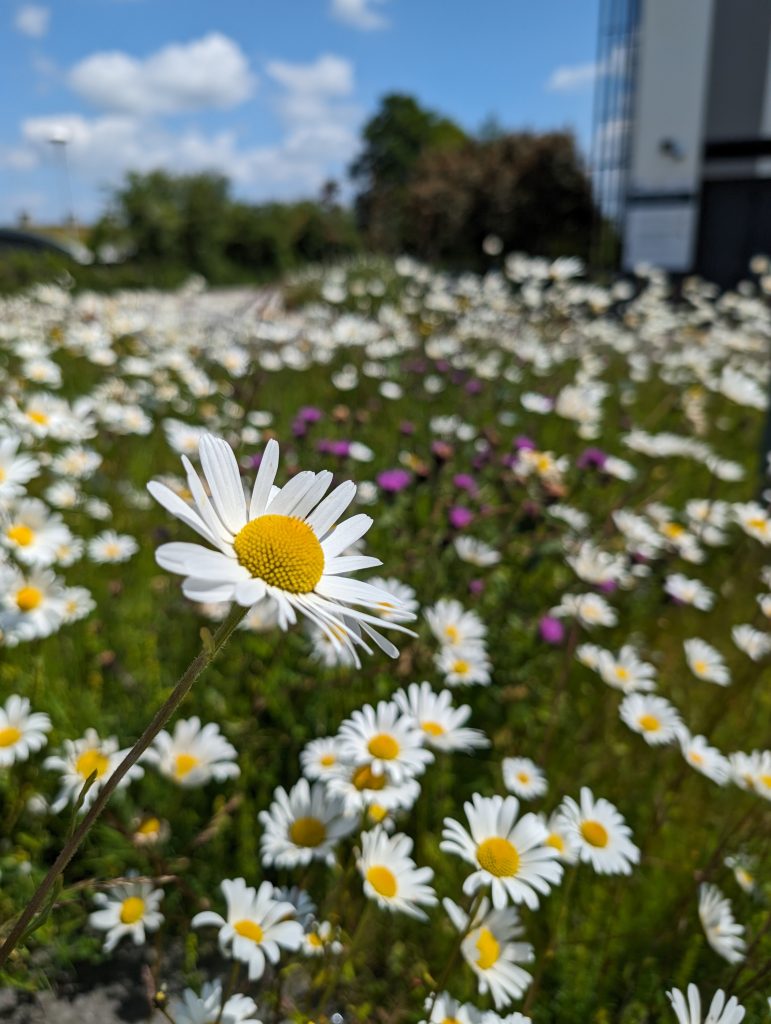
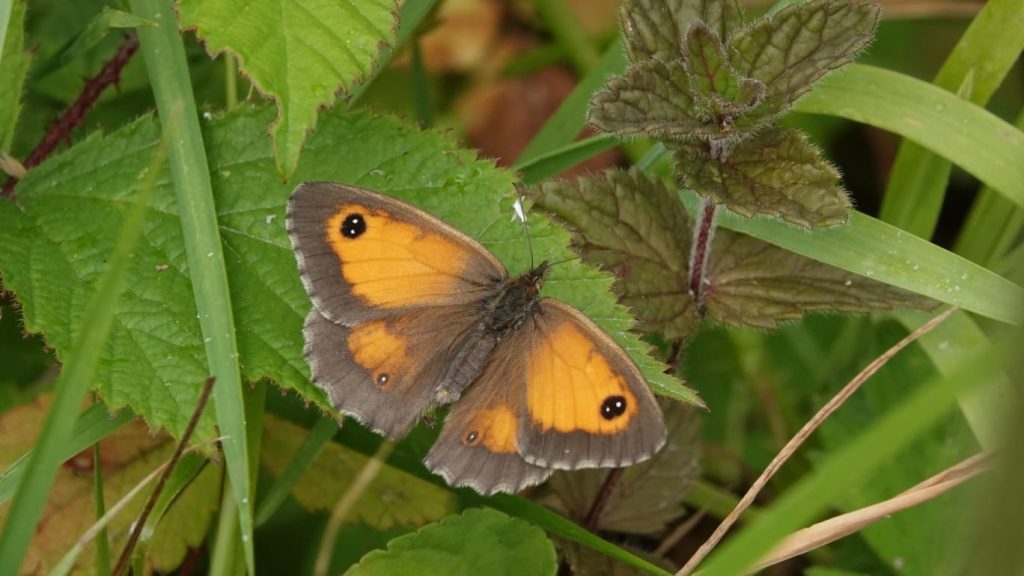
We are pleased that our responsible procurement strategy continues to deliver sustainability across our supply chain and procurement process. Each quarterly meeting with our suppliers now includes an agenda point on carbon reduction, social value and general sustainability actions. This ensures that we are following up on their progress. As part of these meetings, we also request suppliers to look at what value-added benefits they can incorporate into the contract. This can range from free professional services or workshops for students.
20% of scoring in all tenders is allocated to carbon reduction and social value. This has led to:
76% of our core suppliers now committed to a carbon reduction strategy – a 25% increase on last year.
90% of our core suppliers committed to a social value strategy – a 20% increase on last year.
While our goal is to have 100% of our core suppliers enrolled in the NETPositives supplier engagement platform this year (enabling them to create their own sustainability action plans), we’re pleased to have reached a strong 90% and are aiming for full participation by 2025.
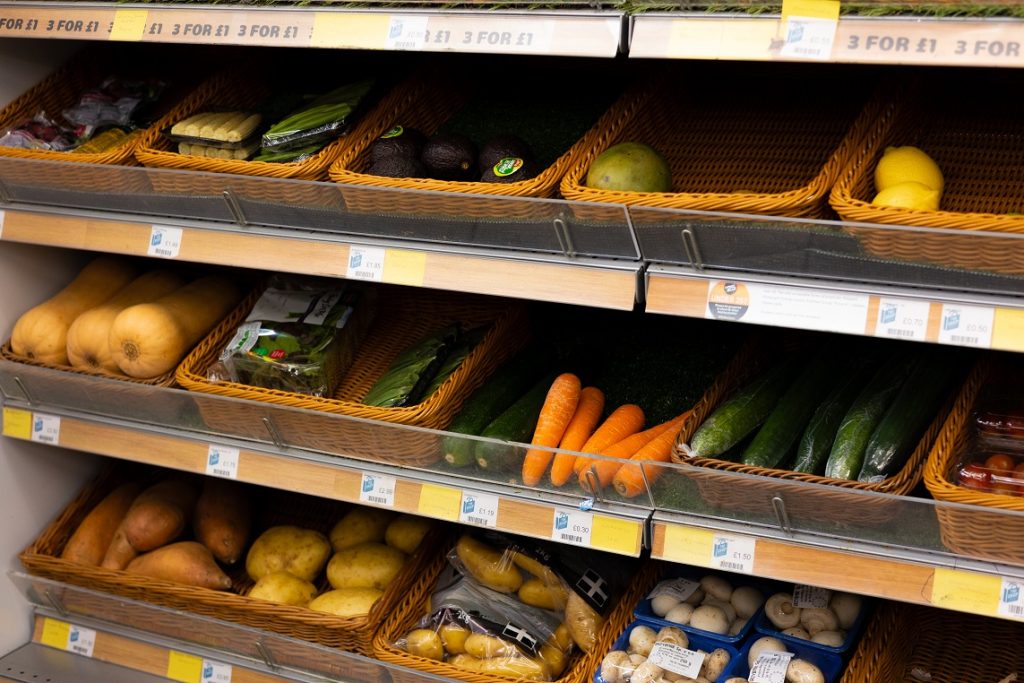
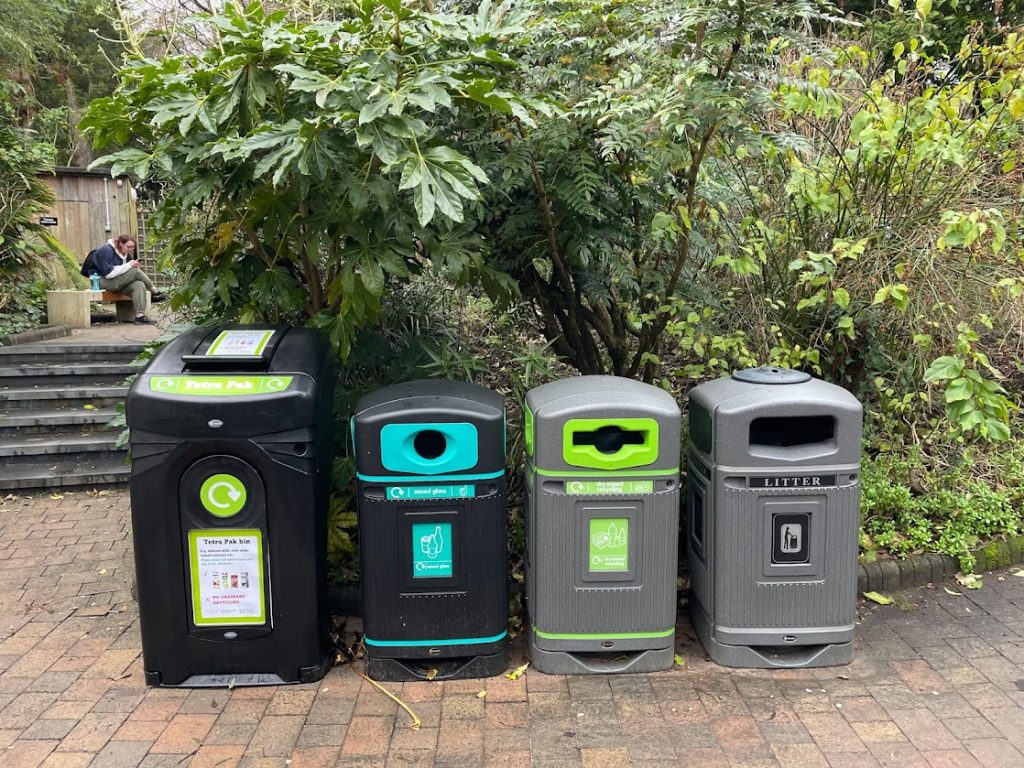
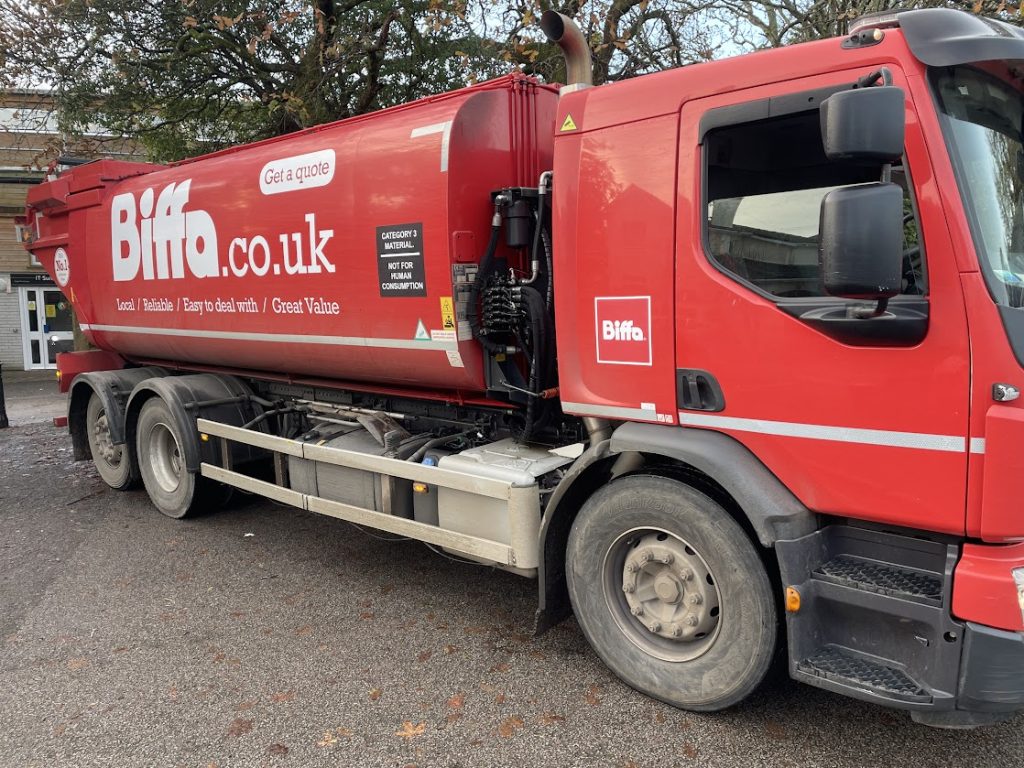
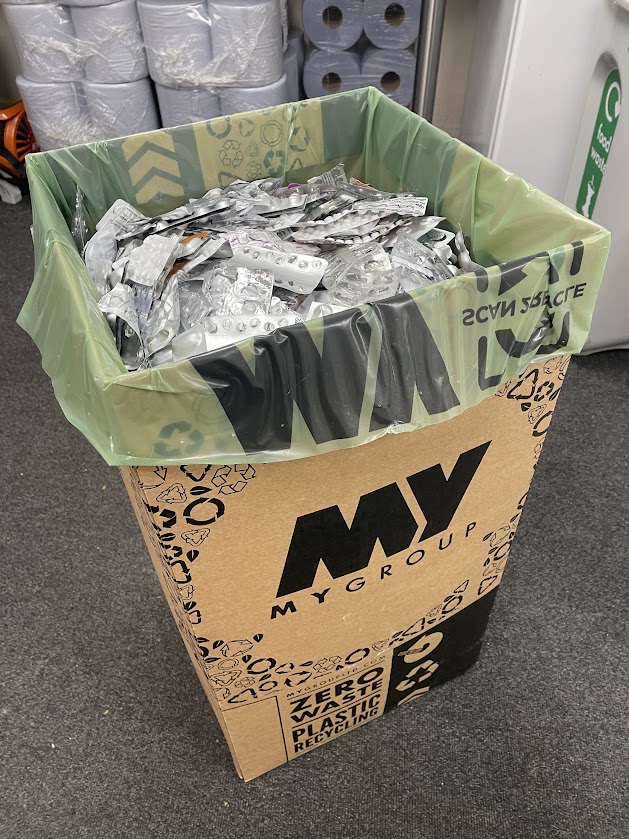
Waste and recycling management systems have been integrated across our campuses to maximise the recycling, reused and the responsible disposal of any material or product waste. Anything that cannot be recycled is sent to an incineration plant in Cornwall which is then generated into supplied energy. Measures are also in place to ensure hazardous waste is managed in accordance with the UK environmental regulations.
Recycling
All campus facilities are equipped with bins for recycling and general waste disposal with clear signage providing guidance about what waste goes into which bin. In the 2023/24 academic year, our total cross campus recycling rate was 34%. Our target each year is to try and increase our recycling rates by 1%.
Food Waste
Our main campus catering outlets and accommodation blocks at Falmouth and Penryn campuses already have food waste collection in place and a project to recycle food waste. Working with Biffa, we encourage students on campus to separate food waste, which is sent to an anaerobic digestion plant where it can be turned into electricity, fuel and fertiliser.
Tetra Paks
Our Tetra Pak recycling program has also expanded, resulting in the recycling of an impressive 14,000 cartons this year.
Donation Points and Reuse
To maximise the recycling and reuse opportunities when students move out, there are temporary donation point at Glasney Lodge. You can take any clothes, accessories and books in good usable condition and donate them to the British Heart Foundation. For hygiene and safety reasons they are unable to accept some items such as knives, pillows, duvets and large electricals. There is also a Food Bank collection trolley for in-date, unopened food items.
Donation and second life purchasing events will be organised on campus throughout the year in replace of the previous campus Swap Shops.
Behaviour Change Programs
We continue to roll out initiatives designed to drive positive behaviour change. We were the first university to launch the ‘Bin it to Win it’ campaign, featuring ‘smart segregation’ QR codes that incentivise proper recycling, with a chance to win a £1,000 prize for correct waste disposal.
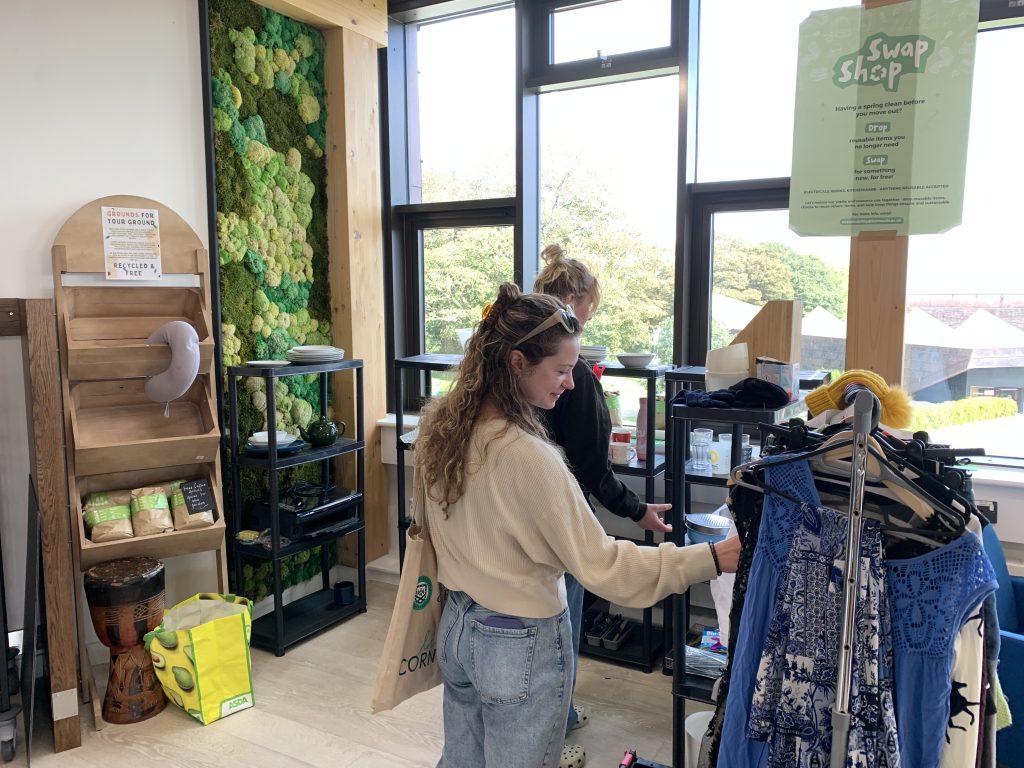
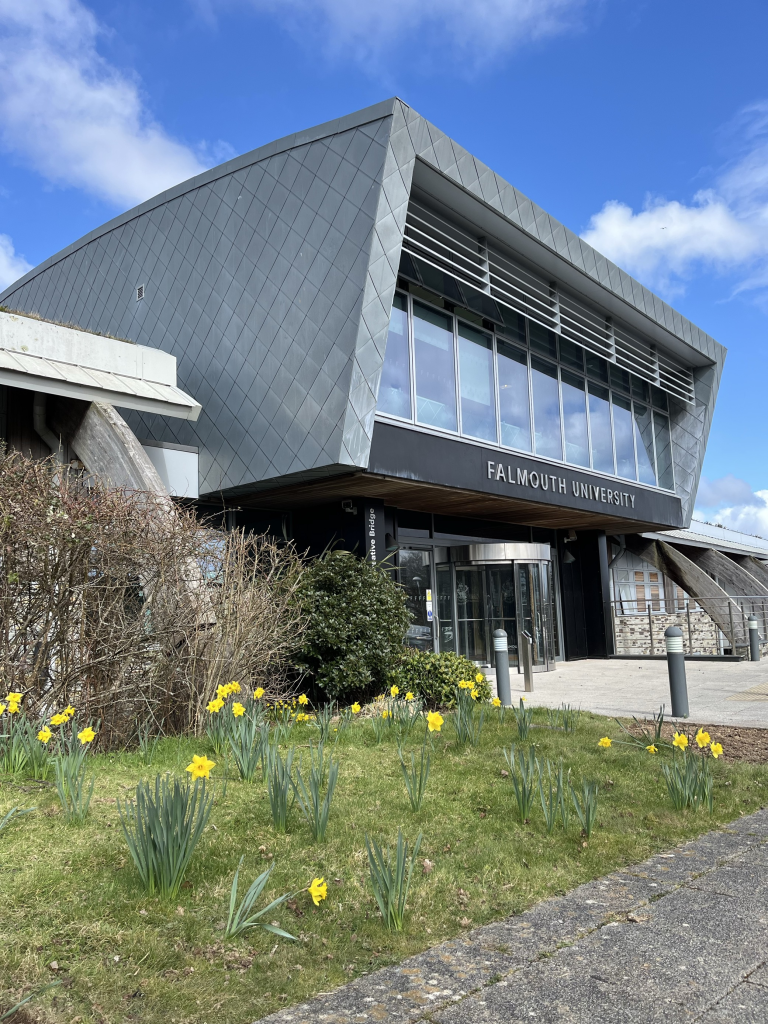
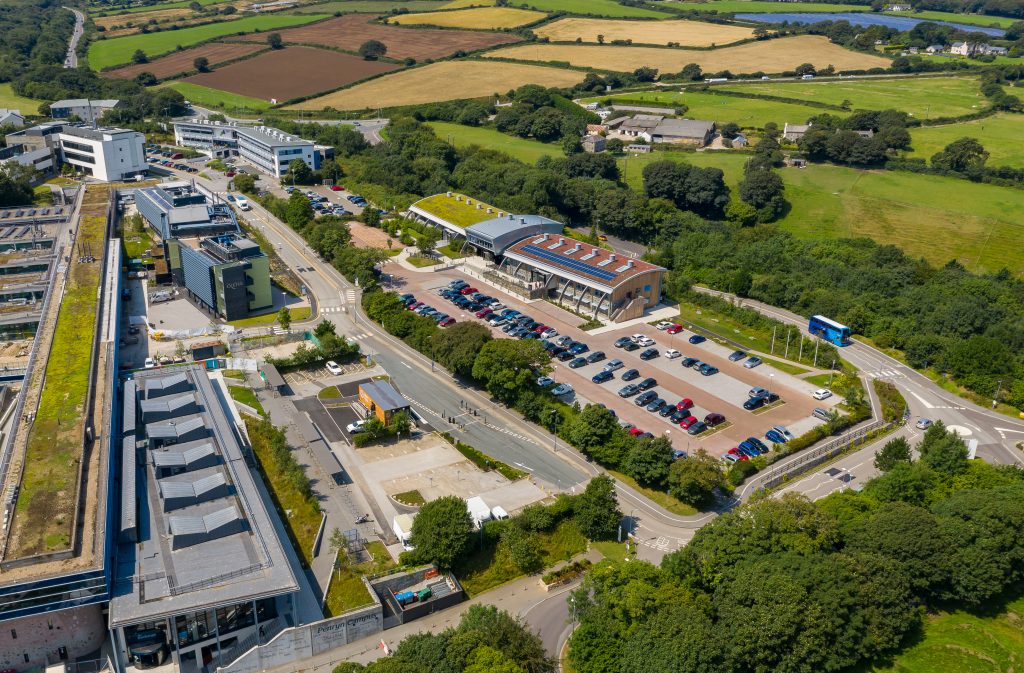
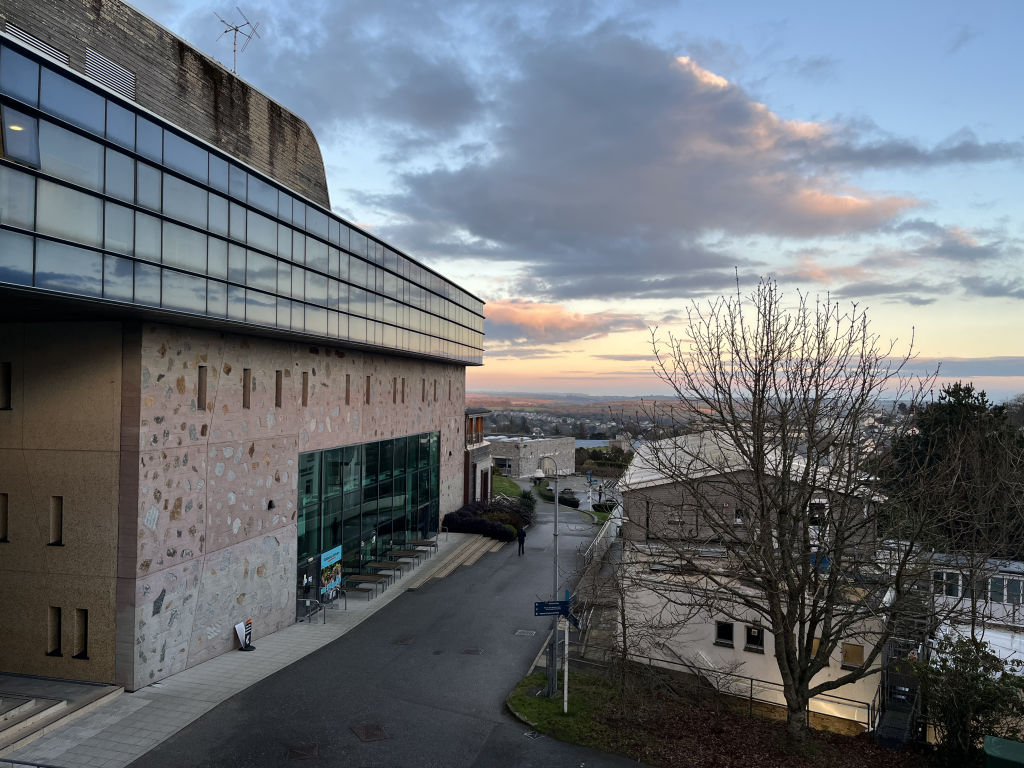
Nine buildings across our campuses have obtained either an excellent or outstanding BREEAM rating. BREEAM is an internationally used sustainability assessment method for the built environment.
BREEAM awards by building:
- Environment Sustainability Institute (ESI): Outstanding
- Tremough Innovation Centre (TIC): Excellent
- The Exchange: Excellent
- Academy for Innovation and Research (AIR): Excellent
- Fox 4: Good
- Science & Engineering Research Support Facility (SERSF): Excellent
- Launchpad: Excellent
- Renewable Energy Engineering Facility (REEF): Excellent
- Stella Turk: Excellent


